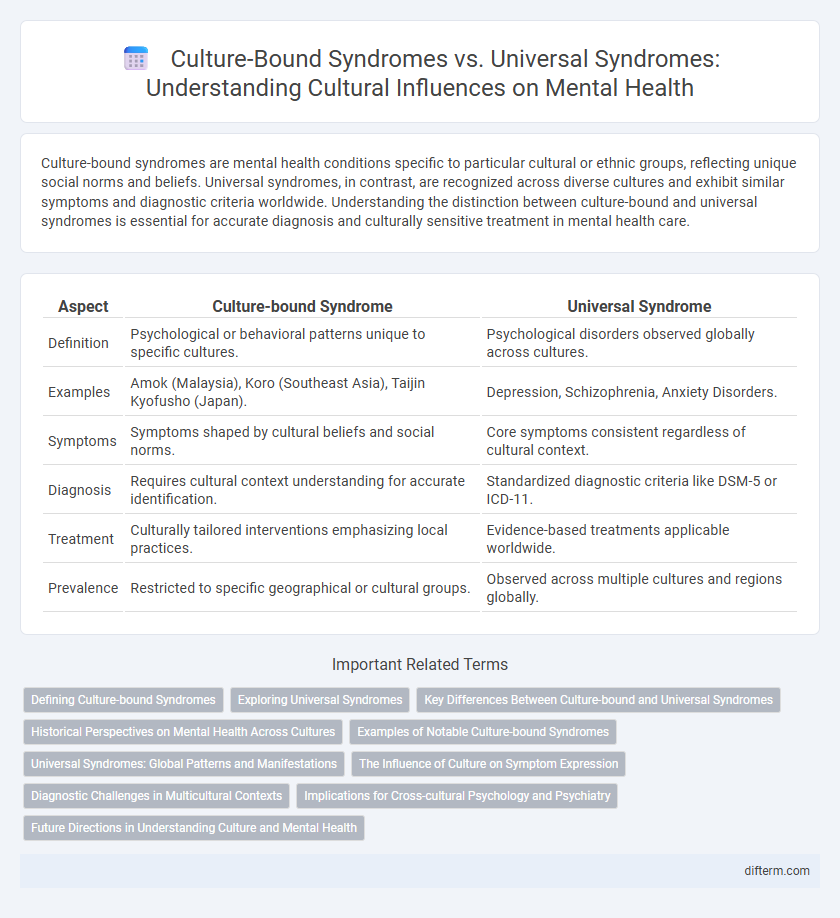Culture-bound syndromes are mental health conditions specific to particular cultural or ethnic groups, reflecting unique social norms and beliefs. Universal syndromes, in contrast, are recognized across diverse cultures and exhibit similar symptoms and diagnostic criteria worldwide. Understanding the distinction between culture-bound and universal syndromes is essential for accurate diagnosis and culturally sensitive treatment in mental health care.
Table of Comparison
| Aspect | Culture-bound Syndrome | Universal Syndrome |
|---|---|---|
| Definition | Psychological or behavioral patterns unique to specific cultures. | Psychological disorders observed globally across cultures. |
| Examples | Amok (Malaysia), Koro (Southeast Asia), Taijin Kyofusho (Japan). | Depression, Schizophrenia, Anxiety Disorders. |
| Symptoms | Symptoms shaped by cultural beliefs and social norms. | Core symptoms consistent regardless of cultural context. |
| Diagnosis | Requires cultural context understanding for accurate identification. | Standardized diagnostic criteria like DSM-5 or ICD-11. |
| Treatment | Culturally tailored interventions emphasizing local practices. | Evidence-based treatments applicable worldwide. |
| Prevalence | Restricted to specific geographical or cultural groups. | Observed across multiple cultures and regions globally. |
Defining Culture-bound Syndromes
Culture-bound syndromes are mental health disorders or patterns of abnormal behavior that are specific to particular cultural groups, often reflecting unique cultural beliefs, practices, and social environments. These syndromes are not universally recognized across all cultures and may be interpreted differently depending on cultural context, such as Amok in Southeast Asia or Koro in parts of Africa and Asia. Unlike universal syndromes like depression or schizophrenia, culture-bound syndromes are deeply embedded in local cultural frameworks, influencing diagnosis, treatment, and understanding within those societies.
Exploring Universal Syndromes
Universal syndromes, such as depression and anxiety disorders, manifest across diverse cultural contexts with consistent symptoms and diagnostic criteria, reflecting shared biological and psychological processes. These syndromes are recognized globally in the Diagnostic and Statistical Manual of Mental Disorders (DSM-5) and the International Classification of Diseases (ICD-11), facilitating standardized treatment approaches. Understanding universal syndromes enhances cross-cultural psychiatric care by emphasizing commonalities in human mental health despite cultural variations.
Key Differences Between Culture-bound and Universal Syndromes
Culture-bound syndromes are mental health disorders rooted in specific cultural contexts, exhibiting unique symptoms and manifestations tied to particular societies, whereas universal syndromes represent psychiatric conditions recognized globally with consistent diagnostic criteria across cultures. The key differences involve etiology, symptom expression, and cultural interpretation, with culture-bound syndromes often lacking standardized diagnostic categories in international classifications like the DSM-5 or ICD-11. Understanding these distinctions is crucial for culturally sensitive diagnosis and treatment, highlighting the role of sociocultural factors in shaping mental health experiences.
Historical Perspectives on Mental Health Across Cultures
Culture-bound syndromes are mental health conditions recognized within specific societies, shaped by unique cultural beliefs and historical experiences, whereas universal syndromes are disorders identified globally with consistent diagnostic criteria. Historical perspectives show that mental health interpretations and treatments varied dramatically, influenced by cultural norms and available knowledge, highlighting the evolution from localized understandings to a more globalized psychiatric framework. Cross-cultural studies emphasize the necessity of integrating cultural context into diagnosis and therapy to enhance the accuracy and effectiveness of mental health care worldwide.
Examples of Notable Culture-bound Syndromes
Dissociative trance disorder, prevalent in Southeast Asia and Africa, exemplifies culture-bound syndromes characterized by altered states of consciousness linked to spiritual beliefs. Koro, observed mainly in Southeast Asia, involves acute anxiety about genital retraction and illustrates the cultural specificity of some syndromes. In contrast, universal syndromes such as depression and post-traumatic stress disorder manifest across diverse cultures with common diagnostic criteria, demonstrating cross-cultural prevalence.
Universal Syndromes: Global Patterns and Manifestations
Universal syndromes exhibit consistent patterns and symptoms across diverse cultures, reflecting common biological and psychological processes shared by humanity. Conditions such as depression, schizophrenia, and anxiety manifest worldwide with core diagnostic criteria recognized by the World Health Organization and the DSM-5, highlighting their global prevalence. Understanding these universal syndromes aids in developing standardized treatment protocols and enhancing cross-cultural mental health research.
The Influence of Culture on Symptom Expression
Culture-bound syndromes manifest specific symptom patterns deeply rooted in particular cultural contexts, reflecting localized beliefs, rituals, and social norms. Universal syndromes present core symptoms consistent across diverse populations, but their expression and interpretation can still be significantly shaped by cultural factors such as language, stigma, and healthcare practices. Understanding the influence of culture on symptom expression is crucial for accurate diagnosis and effective treatment in global mental health.
Diagnostic Challenges in Multicultural Contexts
Diagnosing culture-bound syndromes presents challenges due to their manifestation within specific cultural frameworks, often lacking universal diagnostic criteria. Universal syndromes are identified based on globally recognized symptoms, but cultural variations can influence symptom expression and patient communication. Clinicians must integrate cultural competence and contextual understanding to accurately differentiate between culture-bound and universal syndromes in multicultural settings.
Implications for Cross-cultural Psychology and Psychiatry
Culture-bound syndromes, which are disorders specific to certain cultural contexts, challenge the universality of psychiatric diagnoses and highlight the necessity for culturally sensitive approaches in cross-cultural psychology and psychiatry. Understanding the variations in symptom expression and illness interpretation across cultures informs diagnostic criteria, treatment plans, and therapeutic communication, reducing misdiagnosis and enhancing patient outcomes. Integrating cultural competence into mental health practices supports the development of more effective, culturally tailored interventions and promotes global mental health equity.
Future Directions in Understanding Culture and Mental Health
Future directions in understanding culture and mental health emphasize integrating cultural context into diagnostic frameworks to distinguish culture-bound syndromes from universal syndromes more accurately. Advances in cross-cultural psychiatry promote the development of culturally sensitive assessment tools aiming to improve global mental health outcomes. Increasing collaboration between anthropologists, clinicians, and neuroscientists enhances personalized interventions that respect cultural variations while addressing universal psychological processes.
Culture-bound syndrome vs Universal syndrome Infographic

 difterm.com
difterm.com